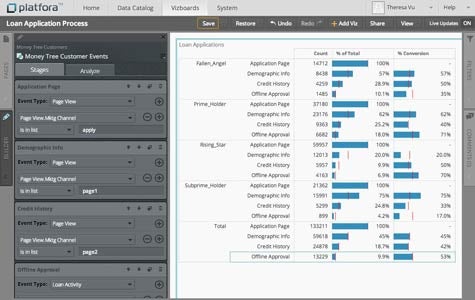For all the hype surrounding Hadoop these days, what ultimately matters is what your organization does with all that information.
At the Strata Conference + Hadoop World 2013 event today, Platfora is showcasing version 3.0 of the Platfora Big Data Analytics Platform, which adds support for streaming analytics and the ability to categorize data around specific entities such as customers or prospects.
According to Platfora CEO Ben Werther, when it comes to analytics, most organizations don’t fully appreciate the potential of Big Data. Traditional analytics applications based on SQL databases require schemas to be in place that Werther says pre-suppose the database administrator knows what questions will be asked.
In contrast, Werther says, analytics applications designed for Big Data are designed for a more iterative approach that makes it easier to identify patterns in data and discover relationships. The end result, says Werther, is not only more discovery of relevant data, but also greater confidence in the analytics being used to recommend the next best course of action for the organization.
In general, Werther says business executives have lost faith in canned business intelligence reports that are based on limited sets of known data. They want to be able to drill down and explore relationships between data sets that don’t require the intervention of either a data scientist or, for that matter, an IT department.
Scheduled to be available in the first quarter of 2014, Platfora is part of a growing number of native Big Data applications that have been written from the ground up to take advantage of Hadoop. While there is clearly a huge amount of interest in Big Data in general and Hadoop in particular these days, business executives are not going to have a lot of patience for extended computer science projects. They want to start see short-term returns on Hadoop investments that will justify additional investments later on.
Consequently, Werther says the age of Hadoop as the platform that gets a lot attention in IT circles is already giving way to the age of Hadoop as applications that drive meaningful value to the business. The only question now is not whether to use Hadoop, but rather how quickly IT organizations can deploy analytics applications that leverage the unique capabilities of Hadoop when, from a business perspective, time to insight is now everything.



